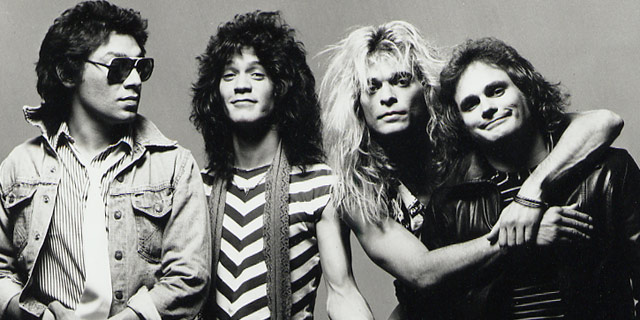
Metal Underground‘s latest “Sunday Old School” article is on VAN HALEN. Start reading it here, and you can continue reading it on their site…
Though the Netherlands have given the world some excellent metal bands over the years such as Pestilence and God Dethroned, the country doesn’t receive as much attention as some others in Europe, such as their neighbours in Germany. However, it’s worth remembering that one of the most important names in the history of hard rock and heavy metal was literally born in the Netherlands in 1953 and 1955, where in the city of Nijmegen, the brothers Alex and Eddie were born, siblings who would go on to bring their surname into rock folklore. The name of Van Halen.
The brothers moved with their family to the United States in 1962 and started to learn instruments shortly afterwards, with Eddie learning drums and Alex learning guitar, though they switched after Eddie found out that Alex had been playing his drums while the younger brother was out on his paper route. They eventually formed a band which they Christened, Genesis, along with bassist Mark Stone and ultimately bringing in singer David Lee Roth, who the band had been hiring a P.A. from, who was hired to save money. Stone was soon replaced by Mark Anthony and another change came when the quartet found out about the British band named Genesis, so decided to rename themselves, Mammoth, though this name would also be dropped in favour of the now familiar, Van Halen.
After slogging it out in the Los Angeles music scene for several years and earning some big name fans such as Gene Simmons of Kiss, who produced a demo tape for the group, Van Halen were eventually signed to Warner Brothers and released their self-titled debut in 1978, which reached number 19 on the Billboard Hot 100 charts, becoming one of the most successful rock debuts of the time. It featured several staples of the band’s catalogue, such as the frantic instrumental, “Eruption,” the memorable bass introduced opener, “Running With the Devil” and a cover of The Kinks’ classic, “You Really Got Me.” Not only did the album perform well, but so did the band, particularly on a tour supporting Black Sabbath, who were promoting their “Never Say Die” record at the time and were reportedly outshone by the young Dutch/American group at practically every show.
Success on and off the road was soon capitalised upon with the release of “Van Halen II” in 1979, which contained their first hit single, “Dance the Night Away.” It was another well received album, as was the next year’s, “Women and Children First,” which didn’t yield any hit singles but contained some more live favourites such as “Everybody Wants Some” and “And the Cradle Will Rock.” Reviews remained positive for their fourth album, “Fair Warning,” which was more progressive in nature but did not sell as well as the albums before it.
Despite the disappointing commercial response to “Fair Warning,” the band bounced back a year later with, “Diver Down,” which sold very well and interestingly featured a clarinet performance from the brothers’ father, Jan Van Halen on the song, “Big Bad Bill.” Their live attraction continued to increase around this time, which earned them a place in the Guinness Book of Records when they were paid $1.5 million for one appearance, making them the most expensive one off live act of the era. Their commercial success somehow further increased with the album, “1984,” released that year and boasting their biggest singles success with the classic lineup in the form of, “Jump,” a synthesizer laden track with an unforgettable chourus, as well as other classic songs in the shape of, “Hot for Teacher” and “Panama.”
Although the band had become wildly successful, tensions between David Lee Roth and Eddie Van Halen had become very apparent and it was to be the singer who was forced from the band and replaced by former Montrose frontman and successful solo artist, Sammy Hagar. Though some were skeptical how Van Halen would fair without Roth, their doubts were put to bed when the band released, “5150” in 1986, which was a massive success and spawned three hits in, “Why Can’t This Be Love?,” Love Walks In” and “Dreams.” Not only did the album top the American charts, but so did their next three releases, beginning with “OU812” two years later, which featured the top five single, “When It’s Love.” They also received a Grammy award for the following album, “For Unlawful Carnal Knowledge,” which spawned some successful singles such as “Don’t Tell Me (What Love Can Do)” and “Can’t Stop Loving You.”
Continue reading at Metal Underground.